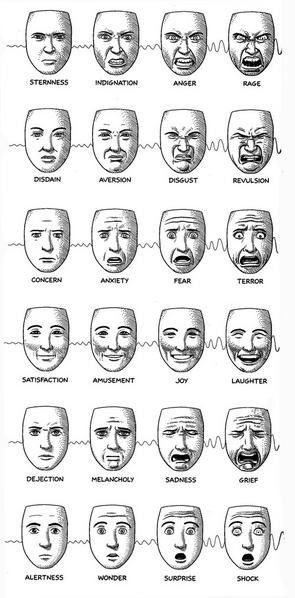Communication with NPCs occurs using a five emotion set of options. Instead of choosing one line of dialog among many, the player puts forth an emotion - or an attitude or approach, depending on the context - and the game issues an utterance appropriate to the player's character, the context and the player's choice. If the circumstances don't warrant specific dialog the character will speak from a stockpile of catch-phrases appropriate to the player's choice of emotion/attitude.
There are a number of different lists of basic emotions. The most well-known is possibly Paul Ekman's: Anger, Disgust, Fear, Happiness, Sadness, Surprise. From Wikipedia:
Ekman devised a list of basic emotions from cross-cultural research on the Fore tribesmen of Papua New Guinea. He observed that members of an isolated culture could reliably identify the expressions of emotion in photographs of people from cultures with which the Fore were not yet familiar. They could also ascribe facial expressions to descriptions of situations. On this evidence, he concluded that the expressions associated with some emotions were basic or biologically universal to all humans.
These five options would be mapped to controls/keys or accessible via the onscreen menu, depending on the player's choice. If the former, the player's choice of character's face would appear, briefly reflecting the choice of emotion; if the latter, the always-on-screen face would change accordingly.
An additional option would be to enable the player to combine the five emotional options into various permutations of the originals, thereby creating more complex communication. Optional though, in that the player can use the simple, standard version when inclined but pursue more nuance when the story motivates them to do so.
Coupled with the possibility that the player could gain more by pursuing – and mastering – the techniques of more nuanced and complex interactions, the mechanism could turn game conversing from rote and predictable repetition, to an additional form of play or a minigame.


No comments:
Post a Comment